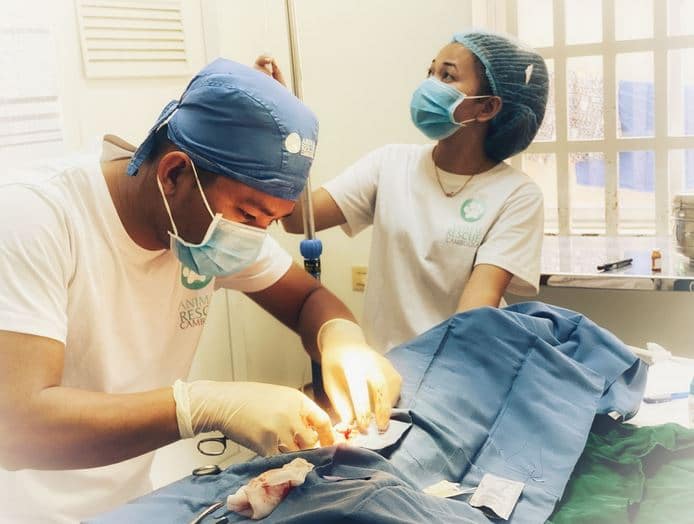ចុចត្រង់នេះដើម្បីអានអត្ថបទជាភាសាខ្មែរ។.
Desexing our beloved cats and dogs is a vital part of responsible pet ownership. Also known as spaying/sterilizing (female cats/dogs) and neutering/castrating (male cats/dogs), desexing has many benefits for the animals and consequently their owners/caretakers.
In this article by Animal Rescue Cambodia (ARC), we would like to shed light on the topic of spaying/neutering young kittens and puppies, known as pediatric spay/neuter. There are a few misconceptions around this topic, which we would like to discuss based on international research and expert experience.
What is Pediatric Spaying/Neutering?
Also known as prepuberal spaying or early spaying means the desexing of a kitten or puppy when they are 3-5 months old.
At ARC, we follow the recommendations of the latest international veterinary guidelines and desex cats and dogs from the age of 3 months or older.
“Desexing your healthy cats and dogs is the best thing you can do as a responsible pet owner. “
~ Dr. Dola, Veterinarian at ARC
Frequently Asked Questions around Desexing Baby Cats & Dogs
Let’s take a look at the most commonly asked questions around pediatric spaying/neutering.
I heard the best age to desex a pet cat/dog is from 6 months or older.
Although veterinarians were previously taught to neuter animals once they are older (6-8 months), recent research has shown that there are many benefits and low risks (even in long-term studies) to spay/neuter dogs and cats as early as 3 months old.
Current research shows that desexing cats and dogs at a young age does not negatively affect their health, body growth, and life expectancy. Pediatric spaying/neutering also does not lead to behavioral problems or an increased risk for infections and obesity.
Hence, more and more veterinary professionals recommend surgery at a young age. The only pre-conditions are that the animal has been examined by a vet and is healthy.
ASPA Pro (the American Society for the Prevention of Cruelty to Animals) has further scientific research on this topic and is worth a read, if you want to learn more about this topic: www.aspcapro.org/resource/dealing-concerns-about-pediatric-spayneuter
My relatives told me it’s better if the cat/dog has babies at least one time before I spay/neuter her.
Cats and dogs experience ‘family’ differently than humans. Of course, they love and have affection for the animals and people around them. But cat mommas normally push their kittens away when they are 3 months old. Likewise, dog mommas push their puppies to independence when they are around 2 months old. There are no studies that show it is medically or emotionally better for cats and dogs to have a litter of kittens or puppies before desexing.
On the other hand, one female cat, her mate, and their offspring can produce 11,000 kittens and more in just 6 years. Likewise, just one female dog, her mate, and their offspring can produce 2,000 puppies and more in just 6 months (source: https://spca.bc.ca/faqs/what-is-the-solution-to-pet-overpopulation).
So, if you have a pet cat or dog, what would you do with all the kittens and puppies? You may find a good home for them, yes. But wouldn’t it be better to give ‘this spot’ to one of the millions of street animals in Cambodia instead? Read more about “Adopt don’t Shop” here.
My friend said that cats/dogs should experience at least one ‘heat cycle’ before desexing.
There is no veterinary research or experience from international vets to support this claim. In fact, research shows that spaying female animals before their sexual maturity (when they start getting ‘in heat’) reduces the risk of breast cancer.
Is it safe for a kitten or puppy to undergo anesthesia and surgery?
Spaying/neutering is a standard routine procedure. While every surgery has risks, it is generally very safe and harmless. The vet team at ARC is highly experienced with spaying/neutering, having done more than 2,600 desexing procedures over the last 5 years.
Our team is also experienced with desexing kittens and puppies, knowing that they have a higher oxygen consumption rate and require increased monitoring for hypothermia. We use recommended drugs and procedures to reduce the anesthetic and surgical risks to a minimum – which we do for all animals we treat, regardless of their age.
And the good news is that younger patients usually recover much more quickly from surgery than adult patients.
Take Action!
Book your appointment to desex your cats/dogs
- Phone/WhatsApp/Telegram: +855 (0)12 340 114 (Khmer, English)
- Email: info@ar-cambodia.com
- Facebook Message
Do you have more questions? Email us at info@ar-cambodia.com

